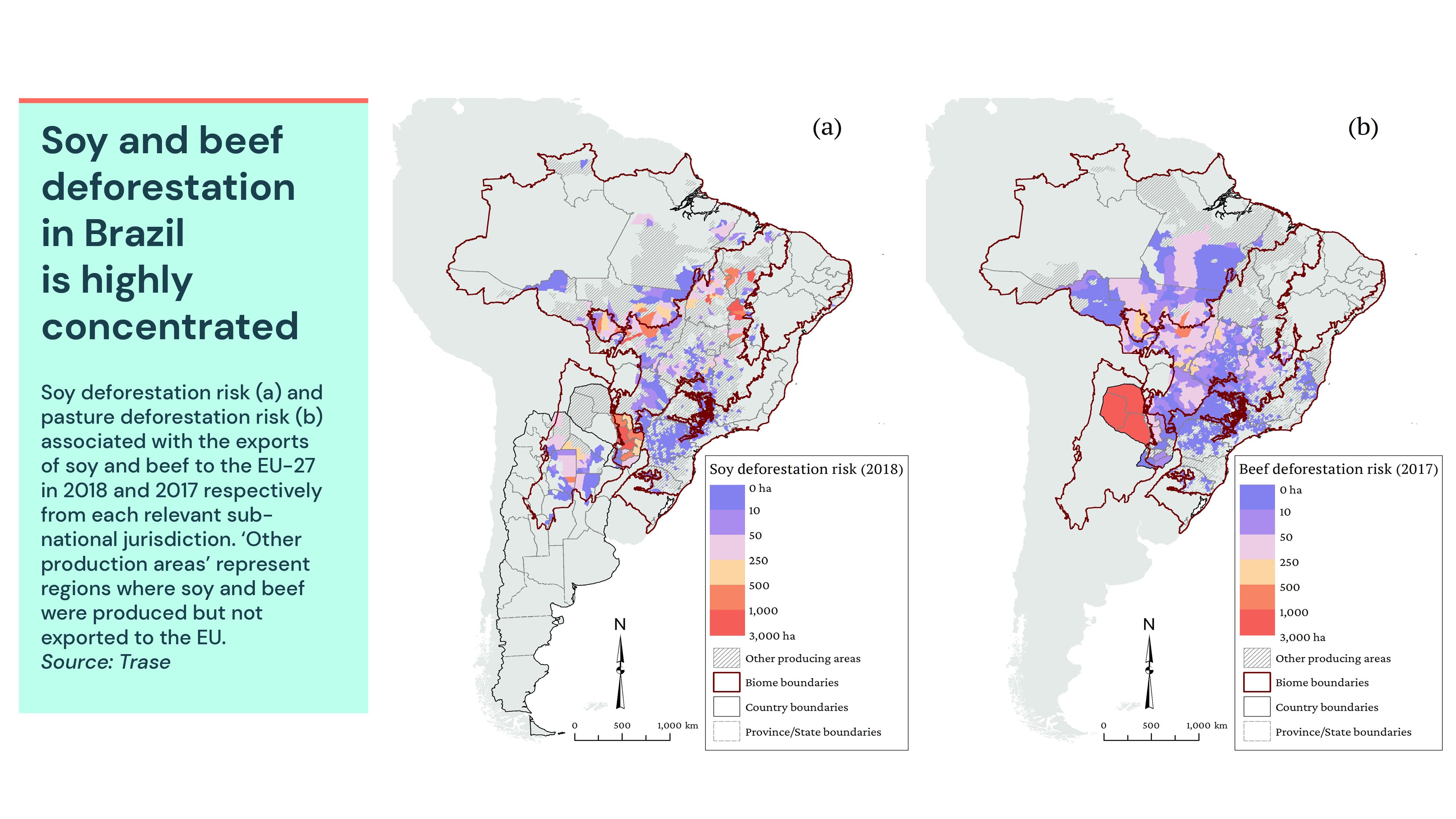
Strengthening the EU regulation on deforestation-free products
Implementation of the draft regulation could be improved by using robust risk assessment to target action on areas threatened most by deforestation.
Read in other languages:
中文Trase has published a policy briefing that highlights opportunities to strengthen the implementation of the EU’s proposed regulation to prohibit the importation of agricultural commodities such as soy, beef and palm oil produced on land deforested after 2020.
Trase welcomes the draft regulation as it sends a clear signal to actors linked to deforestation. With careful implementation, it has the potential not only to achieve its goal of cleaning up EU supply chains, but also to support efforts to reduce commodity-driven deforestation and drive up consumer market standards across the world.
However, implementation challenges lie ahead. Currently, the due diligence mechanism at the core of the proposed regulation requires businesses to collect plot-level geo-locations for all imports regardless of risk level. For imports that come from regions assessed to be at ‘standard’ or high risk, businesses must assess and mitigate the risk that commodities were produced in deforested areas.
Targeting action on higher risk areas
Trase recommends that the EU should integrate a robust and regularly updated sub-national risk benchmarking system further into the proposal than is currently envisaged. This would help tailor the information requirements for demonstrating compliance and support competent authorities in conducting targeted checks, while maintaining the rigour of the requirement for deforestation-free supply.
Deforestation-free compliance can be demonstrated by tracing supplies to low-risk regions, while also segregating those supplies from higher risk regions and maintaining the capacity to identify the supply base under periodic checks. In medium or higher risk regions, more detailed geo-location evidence and stricter segregation would be needed.
Targeting action on places where it can make the most difference is crucial. Trase data shows that commodity deforestation is often highly concentrated in a handful of localities where the commodity is produced. For example, 80% of deforestation linked to EU imports of soy and beef from Brazil occurs in less than 5% of producing municipalities (see figure). While curbing deforestation remains a significant challenge, focusing interventions on the right places can be much more effective.

Fostering a step change in the commodity trade
Tracing commodities back to where they were produced depends on how they were sourced. While some commodities are sourced directly from the producer, which assists traceability, others are sourced indirectly via intermediaries who mix supplies from different locations, sometimes from a large network of smallholder producers. Although limited data is available, new research shows that indirect sourcing accounts for 12-44% for soy, 15-90% of palm oil, 94-99% of live cattle and 100% of cocoa.¹
Given the prevalence of indirect sourcing, the proposed regulation will need to foster a step change in how industry currently operates. The EU needs to invest in partnerships with producer countries and regions to equip stakeholders – especially smallholders and enforcement agencies in high-risk regions – to achieve compliance with the law, and have access to the information necessary to demonstrate deforestation-free supply.
To be successful in driving down deforestation, there is an urgent need to move away from the almost exclusive focus to date on making individual supply chains deforestation-free, towards providing much-needed incentives for individual operators to become deforestation-free suppliers. Commodity buyers can then assess their risk exposure based on who they are sourcing from within the supply chain and across different regions using data from the sub-national benchmarking system.
As far as possible, information on the implementation and enforcement of the regulation should sit in the public domain to facilitate dialogue, independent scrutiny and the exchange of best practice across stakeholder groups.
¹zu Ermgassen, E. et al. Addressing indirect sourcing in zero deforestation commodity supply chains. AgriRxiv. Preprint. October 2021. DOI: 10.31220/agriRxiv.2021.00085.
Download Trase’s policy briefing: EU due diligence proposals on deforestation-free products









